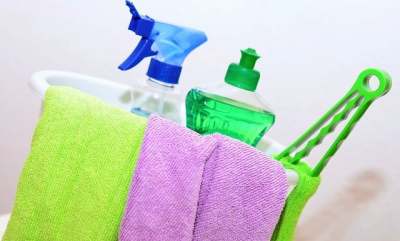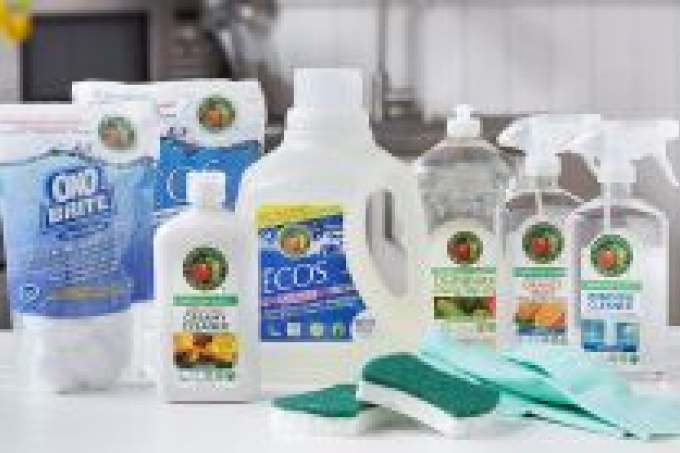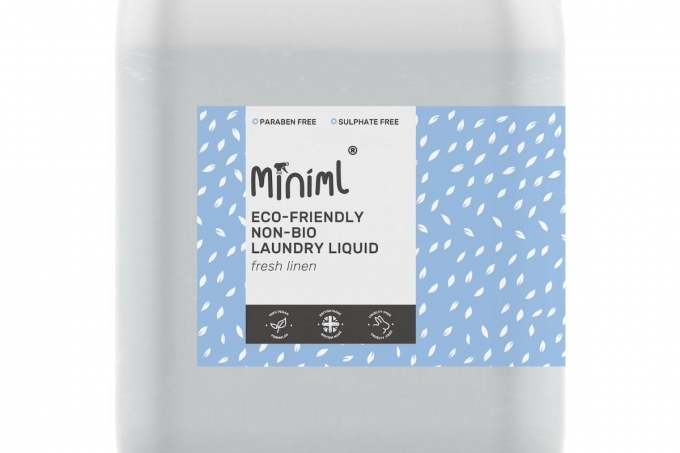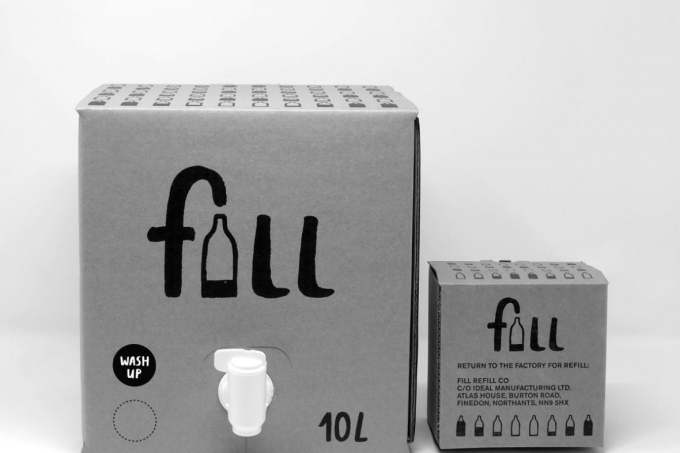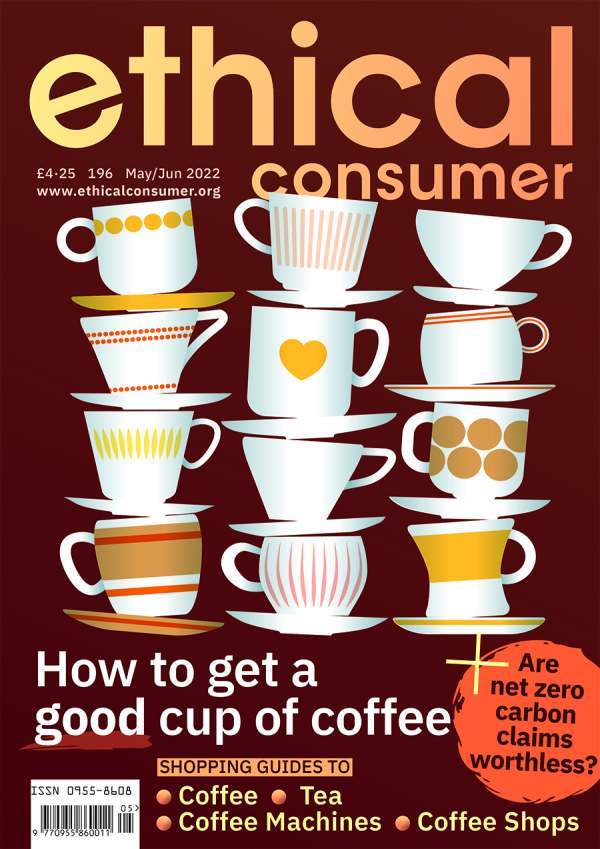Reducing plastic waste when buying household cleaners
Most household cleaners come in single-use plastic bottles but there are five main ways you can reduce plastic waste: refills, bulk buying, concentrates, alternative products and making your own.
Liquid refill stations
Using refill stations significantly reduces the plastic impact of your purchases. This is the best option because super large containers can be used.
Once a fringe ethical phenomenon, more and more shops and companies are now offering refills. And it’s not just health food shops, alternative supermarkets and zero waste stores.
Refill only brands
We’ve also seen a boom in consumer interest in refill-focused companies, like Splosh, SESI, Fill Refill and Miniml, who only sell products to refill an existing bottle with.
SESI, Fill Refill and Miniml have wide networks of refill stations, and Fill Refill and Miniml sell directly to consumers too. Splosh send concentrated refill pouches (which you can return to them for recycling) in the post. All of these companies were awarded a positive Company Ethos mark for their focus on refills.
Bulk-buying
Many other companies included in this guide also offered bulk sizes (2 litres to 20 litres) to consumers so they can 'refill at home': ATTITUDE, Bio-D, ecoleaf, Eco-max, Ecover, Greenscents, and Sonett. Although the plastic impact of bulk purchasing is lower than buying individual bottles, only Greenscents containers can be returned for reuse.
You can also look for bulk containers made from recycled plastics such as Bio-D’s 5 litre bottles or other innovative solutions such as Greenscents’ biopolymer bottles made from sugar cane waste.
A recent Which? report (May 2021) stated that large bottles of household cleaning products used 47% less plastic and needed less space to be transported.
Both refills and bulk purchases re usually a much cheaper way to buy your household cleaners too.
Concentrated products
The main ingredient in household cleaners is water. Refilling with a concentrated solution that you dilute at home significantly reduces the amount of water being unnecessarily transported around and therefore cuts down on carbon emissions. Plus, they use less packaging.
Which? magazine recently assessed (May 2021) the environmental impact of different household cleaning products and found that concentrated products used 75% less plastic packaging and 97% less water. The report also found that refill pouches, like those sold by Splosh, used 85% less plastic.
Cif, Lifebuoy, Smol, Splosh, Eco-max, Eco-Vibe all sold concentrated products.
Recycled packaging, refills, bulk sizes and concentrated cleaning products - who sells what
Below we list how all the brands fare on this issue. The best are those that are plastic-free or only do refill products. Of the big best-selling brands, only Unilever seems to be making an effort.
Best for reducing plastic
- Greenscents – bulk sizes, which can be returned to them for reuse, and refill stations. Standard size bottles made from biopolymer, from waste sugar cane
- Bio D – bulk sizes and refill stations. Majority of single bottles and bulk sizes are 100% Recycled plastic, apart from 20 litre bulk refill containers.
- SESI – refill only from stockists
- Fill Refill - Supplied in 500ml glass bottles & jars and/or 10l bag-in-box for home refill. Bag can be returned to them for refill. Or refill at stockists.
- Miniml – buy filled PET or glass bottles and/or 5l or 20l containers to refill from home. Containers can be returned to them for reuse. Or refill from stockist.
- Ecoleaf by Suma – 5l and 20l bulk sizes for refill at home and refill stations. All bottles and bulk containers are 100% recycled plastic
Recommended for reducing plastic
- Splosh – buy a filled plastic bottle then buy through the post concentrated pouches of cleaners. Pouches can be returned to Splosh for reuse or recycling.
- Bentley Organics – no info re sustainability of its packaging
Other household cleaning brands
- Attitude – Standard bottles are recycled plastic. 2L eco-refill boxes are plastic bag in a box which can be put in recycling
- Cif ecorefill - a 10x concentrated refill for kitchen and bathroom sprays
- Cif cream cleaner bottles are 50% recycled plastic
- Cif Nature’s Recipe is 100% recycled plastic
- Eco-Max – 1 litre plastic bottles and 4 litre refill containers. Also sells concentrate - 1 litre of floor and surface cleaner makes 90 litres.
- Ecover - most bottles use 75% PlantPlastic, from sugar cane, and 25% recycled plastic. Toilet cleaner is 50% recycled. 5 litre Bulk sizes and refill stations.
- Eco Vibe water soluble sachets of concentrated cleaners and solid toilet bombs.
- Ecozone bottles either 100% or 50% recycled plastic. Some bulk sizes.
- Lifebuoy multisurface – (Unilever) – Ecorefill for the Cleaner Spray bottle is 10x concentrated
- Mr Muscle (SC Johnson) – 100% PCR plastic bottle.
- Method – 100% recycled plastic. 2 litre refill bottles available for their standard 828ml bottles
- Planet Detox – no plastic packaging, solid cleaning soap bars, floor cleaning powder and toilet scrub powder. Come wrapped in paper or in a paper bag.
- Smol – buy a starter pack with recycled plastic bottles from them once and reuse by adding concentrated tablets to warm water. Tablets sent through the post.
- Sodasan bottles 100% recycled pet or glass
- Sonett – 5l, 10l and 20l bulk sizes but bottles are virgin plastic.
No info re packaging and refills
- Reckitt Benckiser brands – Cillit Bang, Dettol, Vanish
- P&G brands – Flash, Microban 24 hours, Viakal
- Domestos – Unilever
- McBride – Oven Pride, Clean N Fresh
- Astonish
- Easy
- Bentley Organic

